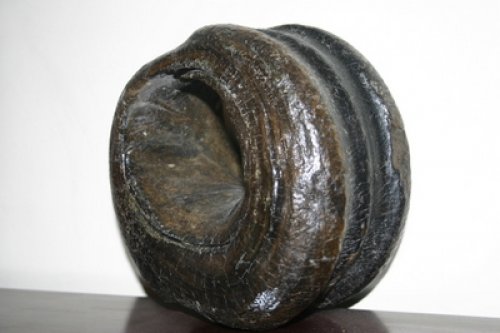You are using an out of date browser. It may not display this or other websites correctly.
You should upgrade or use an alternative browser.
You should upgrade or use an alternative browser.
Primitive tool -anchor - weight? any ideas?
- Thread starter downeastdigger
- Start date
RED Matthews
Well-Known Member
This is a dead eye I preserved a few years ago, and its holding up quite nicely. Dave
Well Dave - I guess I need you to tell me what a dead eye really is? RED Matthews
Red, A deadeye is a device used to tighten the ship's rigging,so the ropes can hold the masts, is one is alder wood around 1800. downeastdigger if you put that artifacts back in fresh water for a few weeks I think you can save it. looks like it came out of fresh water better than saltwater, dave
downeastdigger
Well-Known Member
- Joined
- Aug 22, 2005
- Messages
- 3,364
- Reaction score
- 13
- Points
- 38
Dave, thanks for the advice, I think I'll give it a try
willong
Well-Known Member
Hey Bram,
One of the most interesting non-bottle finds I've seen exhibited on this forum, not excluding the privy recovered black dildo!
I haven't visited the site in a long time; so, I've been scrolling backwards. I just came upon your "primative anchor" or "poke" find. I'm inclined to agree with the anchor interpretation--I think that the "flukes" are too delicately made for it to have been intended as a poke for livestock; whereas, they make perfect sense for slicing into sandy or muddy bottoms. I sure hope that you heeded the advice about reimmersing it in water. I think that item might be more important and valuable of a find than most of the bottles that you are likely to discover. Depending upon how cold the temperatures were, and whether or not it spent most of its time buried in mud, sealed off from oxygen, that artifact could well be over two hundred years old.
If ownership were not brought into question, it is an item that I would certainly advise having a professional archeologist or museum curator look over--preferably one well versed in late colonial woodworking techniques together with maritime history of your region. Forego the oil treatments unless you find that it is not all that important of an item--Jnoon and d12 are more on track in their recommendations. If it's important, you might find a museum willing to have it professionally conserved in exchange for a loan.
Please update us if you learn more.
Regards,
Will
One of the most interesting non-bottle finds I've seen exhibited on this forum, not excluding the privy recovered black dildo!
I haven't visited the site in a long time; so, I've been scrolling backwards. I just came upon your "primative anchor" or "poke" find. I'm inclined to agree with the anchor interpretation--I think that the "flukes" are too delicately made for it to have been intended as a poke for livestock; whereas, they make perfect sense for slicing into sandy or muddy bottoms. I sure hope that you heeded the advice about reimmersing it in water. I think that item might be more important and valuable of a find than most of the bottles that you are likely to discover. Depending upon how cold the temperatures were, and whether or not it spent most of its time buried in mud, sealed off from oxygen, that artifact could well be over two hundred years old.
If ownership were not brought into question, it is an item that I would certainly advise having a professional archeologist or museum curator look over--preferably one well versed in late colonial woodworking techniques together with maritime history of your region. Forego the oil treatments unless you find that it is not all that important of an item--Jnoon and d12 are more on track in their recommendations. If it's important, you might find a museum willing to have it professionally conserved in exchange for a loan.
Please update us if you learn more.
Regards,
Will
Similar threads
- Replies
- 2
- Views
- 637
- Replies
- 6
- Views
- 1K
Latest posts
-
-
Any help identifying any of these is greatly appreciated
- Latest: hemihampton
-
-
-
Latest threads
-
-
C.1870 Utah drugstore with a snake on pestle
- Started by timeandabottle
- Replies: 0
-
Rare Utah can added to my collection!
- Started by timeandabottle
- Replies: 0
-
-
-


